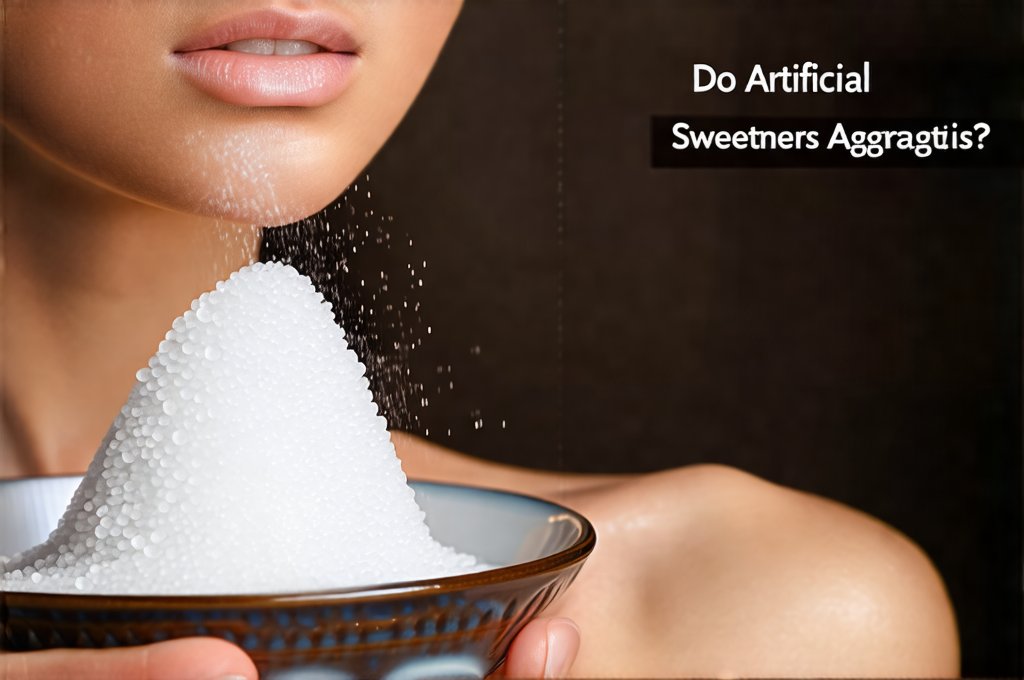Cystitis, an often debilitating inflammation of the bladder, impacts millions worldwide, predominantly affecting women. Characterized by symptoms ranging from frequent urination and painful burning sensations to lower abdominal discomfort, cystitis can significantly disrupt daily life. While bacterial infections are a common culprit, chronic or recurrent cystitis cases frequently present more complex origins, prompting investigation into dietary factors and their potential influence on bladder health. Increasingly, individuals are questioning the role of artificial sweeteners in exacerbating these conditions, driven by anecdotal reports and growing awareness of gut microbiome interactions with overall health.
The pervasive presence of artificial sweeteners in modern diets – found in diet sodas, sugar-free candies, yogurts, and countless processed foods – raises legitimate concerns about their impact on various bodily systems. The allure of “sugar-free” alternatives often overshadows the potential downsides, especially for individuals susceptible to sensitivities or pre-existing health conditions. While marketed as harmless substitutes for sugar, artificial sweeteners aren’t metabolically inert; they interact with our bodies in complex ways that are still being unravelled by researchers. This article will explore the connection between artificial sweetener consumption and cystitis aggravation, examining the proposed mechanisms, current research findings, and practical considerations for those experiencing bladder issues.
Artificial Sweeteners & The Gut Microbiome: A Potential Link to Cystitis
The human gut microbiome—the vast community of microorganisms residing in our digestive tract—plays a critical role in overall health, influencing immunity, nutrient absorption, and even mental wellbeing. Disturbances in this delicate ecosystem, known as dysbiosis, have been linked to numerous chronic conditions, including inflammatory bowel disease, autoimmune disorders, and increasingly, bladder dysfunction. Several studies suggest that artificial sweeteners can significantly disrupt the gut microbiome composition. For instance, saccharin has been demonstrated to alter microbial populations, potentially reducing beneficial bacteria while promoting growth of harmful ones.
This disruption isn’t merely theoretical; it has demonstrable consequences for immune function. A compromised gut microbiome weakens the body’s natural defenses, making individuals more vulnerable to infections and inflammatory responses. In the context of cystitis, a dysbiotic gut can contribute to increased intestinal permeability (“leaky gut”), allowing bacterial toxins to enter the bloodstream and potentially triggering systemic inflammation that extends to the bladder. Moreover, imbalances in the gut microbiome can affect the production of short-chain fatty acids (SCFAs), crucial metabolites known for their anti-inflammatory properties; reduced SCFA levels could further exacerbate bladder inflammation.
The specific impact varies depending on the type of artificial sweetener consumed. Aspartame, sucralose, and acesulfame potassium have all been shown to alter gut microbial diversity in different ways, leading to unique downstream effects. It’s important to note that individual responses also differ significantly; what disrupts one person’s microbiome may not affect another in the same way due to variations in genetics, diet, and lifestyle factors. However, the mounting evidence suggests a strong correlation between artificial sweetener consumption and gut dysbiosis, raising concerns about their potential role in aggravating cystitis symptoms. For individuals experiencing frequent or persistent issues, exploring what to do about constant low-level UTI symptoms can provide additional insight and support.
Bladder Irritation & Artificial Sweeteners: Direct Effects & Sensitization
Beyond the indirect effects mediated through the gut microbiome, some research points to the possibility of direct bladder irritation caused by certain artificial sweeteners. The bladder lining is a sensitive tissue prone to inflammation, and exposure to irritants can trigger discomfort and exacerbate symptoms of cystitis. While not universally accepted, some individuals report experiencing increased urgency, frequency, or pain after consuming products containing artificial sweeteners.
This sensitivity may be linked to the chemical structure of these compounds. For example, sucralose is a chlorinated sugar molecule that could potentially irritate the bladder epithelium in susceptible individuals. Similarly, aspartame breaks down into several metabolites within the body, some of which have been implicated in causing inflammatory responses. It’s also possible that artificial sweeteners lower the threshold for bladder sensitivity, essentially making the bladder more reactive to other irritants like caffeine, alcohol, or acidic foods.
Furthermore, chronic exposure to these compounds could lead to sensitization—a process where the body becomes increasingly sensitive to even small amounts of an irritant over time. This explains why some individuals with cystitis find that symptoms worsen with continued artificial sweetener consumption, even after initially tolerating them without issue. Identifying individual triggers is crucial for managing cystitis effectively, and eliminating or reducing artificial sweetener intake may be a beneficial step for many sufferers. Understanding the impact of diet sodas and artificial sweeteners on cystitis can help inform dietary choices.
Identifying Trigger Sweeteners & Individual Sensitivity
Determining which specific artificial sweeteners trigger cystitis symptoms requires careful observation and potentially an elimination diet. It’s not necessarily about avoiding all artificial sweeteners entirely; rather, it’s about identifying the culprits that exacerbate your individual condition. Here are a few strategies:
- Keep a detailed food diary: Track everything you eat and drink for several weeks, noting any cystitis symptoms (frequency, urgency, pain levels) alongside your consumption of artificial sweeteners.
- Elimination diet: Remove all products containing artificial sweeteners from your diet for at least two to four weeks. Gradually reintroduce one sweetener at a time, carefully monitoring for symptom recurrence.
- Read ingredient labels meticulously: Artificial sweeteners are often hidden in unexpected places, such as medications, mouthwash, and even seemingly “healthy” snacks. Look beyond the sugar content and scrutinize the ingredients list for terms like aspartame, sucralose, saccharin, acesulfame potassium (Ace-K), or neotame.
- Consider professional guidance: A registered dietitian or healthcare provider can help you design an effective elimination diet and interpret your results accurately.
The Role of Inflammation & Bladder Wall Integrity
Chronic inflammation is a hallmark of many cystitis cases, contributing to the breakdown of the protective glycosaminoglycan (GAG) layer that lines the bladder wall. This GAG layer acts as a barrier against irritants, preventing them from penetrating the underlying tissues and triggering inflammation. When this layer is compromised—due to chronic irritation, infection, or other factors—the bladder becomes more vulnerable to damage.
Artificial sweeteners may contribute to this process in several ways. As mentioned earlier, they can promote gut dysbiosis and systemic inflammation, which can indirectly weaken the GAG layer. Additionally, some artificial sweeteners have been shown to increase oxidative stress – an imbalance between free radicals and antioxidants – further exacerbating bladder wall damage. By disrupting the delicate balance of the bladder ecosystem, these compounds could accelerate the progression of chronic cystitis.
Alternatives & Supportive Strategies for Bladder Health
If you suspect that artificial sweeteners are aggravating your cystitis symptoms, exploring alternative strategies is essential. Here are some suggestions:
- Prioritize whole foods: Focus on a diet rich in fruits, vegetables, lean proteins, and healthy fats. Minimize processed foods containing hidden sugars or artificial sweeteners.
- Hydrate adequately: Drinking plenty of water helps to dilute urine and reduce bladder irritation. Aim for at least 6-8 glasses per day.
- Explore natural sweeteners (in moderation): While sugar itself can be irritating for some, small amounts of natural sweeteners like maple syrup, honey, or stevia may be less problematic than artificial alternatives. However, use these sparingly and monitor your response.
- Support gut health: Consume probiotic-rich foods like yogurt, kefir, or sauerkraut to promote a healthy microbiome. Consider a probiotic supplement if recommended by your healthcare provider.
- Manage stress: Chronic stress can weaken the immune system and exacerbate inflammation. Incorporate stress-reducing techniques such as yoga, meditation, or deep breathing exercises into your daily routine.
It’s crucial to remember that cystitis is often multifactorial, and addressing it requires a holistic approach tailored to individual needs. While artificial sweeteners may not be the sole cause of symptoms for everyone, eliminating or reducing their consumption can be a valuable step towards improving bladder health – particularly for those who suspect a connection between these compounds and their condition. Patients concerned about potential effects on kidney function might also consider can artificial sweeteners contribute to kidney problems?. Additionally, understanding if artificial sweeteners affect urine tests can be helpful for accurate diagnosis. Lastly, exploring low-sugar drinks that do not aggravate the bladder can offer alternatives to sweetened beverages.





















